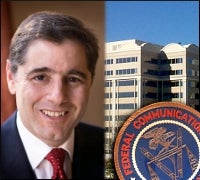 |
As Julius Genachowski, President Obama’s appointee to head the Federal Communications Commission, heads for his confirmation hearing tomorrow, a handful of activist groups are looking to get him on the record about the open Internet right off the bat.
Confirmation hearings for some of Obama’s other tech-related appointments, including Gary Locke for Commerce Secretary and Aneesh Chopra’s proceeding that cleared the way for him to step in as the nation’s first CTO, have been generally congenial proceedings with the smiling senators lobbing in softballs and welcoming the appointees and their families to Washington.
But no regulatory agency has more bearing on the development of the Internet than the FCC, which has made Genachowski’s selection one of the more anticipated appointments among Internet advocacy groups.
Six of those groups, ranging from the digital-rights organization Public Knowledge to the United Church of Christ Office of Communication, have submitted a list of questions to Commerce Committee Chairman John Rockefeller that amounts to a thinly veiled policy primer for their activist agenda concerning the new FCC.
The groups, each members of the Media and Democracy Coalition, presented Rockefeller and other senior members of the committee a line of inquiry that would flesh out Genachowski’s stance on a number of critical issues for the progressive tech-policy faction, such as Net neutrality, open Internet access, broadband adoption, and diversity and localism in media ownership.
A longtime friend and adviser to Obama, Genachowski was one of the chief architects of his tech policy platform as a candidate. Genachowski’s positions on issues like Net neutrality (strongly in favor) are well known. Progressive tech policy groups, including Public Knowledge, were quick to cheer his selection in March, and analysts expect his tenure at the heavily-lobbied FCC to shift the agency’s focus toward issues backed by non-traditional players like Google (NASDAQ: GOOG) and Skype, likely at the expense of the incumbent cable and telco companies.
Also appearing at tomorrow’s hearing will be Republican Robert McDowell, whom Obama recently appointed to serve a second term.
In addition to Net neutrality, the new FCC could take a closer look at the agreements wireless service providers strike with handset makers and the way they determine which applications can run on their networks. The groups’ submission to Rockefeller left little doubt as to where they stand on the issue.
“Right now wireless providers restrict consumers’ ability to use the device of their
choice with wireless service. Shouldn’t wireless customers have the same rights as users of wired services have had since 1968?” they wrote, referring to a landmark FCC decision that required the AT&T to allow other companies’ devices to connect to its network. “Do you believe that wireless providers are right in doing this?”
The open access issue has been simmering at the FCC for some time, with VoIP provider Skype having petitioned the agency to write open access into its rules for wireless carriers.
More recently, calls have been mounting for the FCC to take a tougher stance on the type of exclusivity agreements that allow the iPhone only to work on AT&T’s network.
Today, four members of the Commerce Committee sent a letter to Acting Chairman Michael Copps expressing concern over the issue. The same committee that will decide Genachowski and McDowell’s fate tomorrow plans a hearing on wireless exclusivity agreements on Wednesday as concerned senators mull legislation on the issue.
An alternate, more decentralized effort to influence tomorrow’s confirmation proceeding can be found on Facebook. There, the group “Fast Internet for All” has formed with the mission to “convince the new FCC to bring 21st Century Internet to America.”
The group, created by Britt Blaser, has set up a survey of 25 questions to ask the nominees tomorrow, calling for the community to rate and edit them in the fashion of a wiki.
Their questions are largely about broadband access, which can be expected to figure prominently in tomorrow’s hearing. The Commerce Committee is populated with many of the more tech-conscious senators, and one of Genachoswki’s biggest tasks will be the development of a national broadband strategy, a task the agency was charged with in the February economic stimulus package.
The expected confirmations of Genachowski and McDowell would still leave the FCC short two permanent commissioners. Democratic appointee Mignon Clyburn is still awaiting her confirmation hearing, and Obama has yet to name another Republican.
In the meantime, Democrat Jonathan Adelstein continues to occupy a spot on the FCC pending his confirmation to take over the Rural Utilities Service, a division of the Agriculture Department that will dole out $2.5 billion of the $7.2 billion in broadband loans and grants set aside in the stimulus bill.


